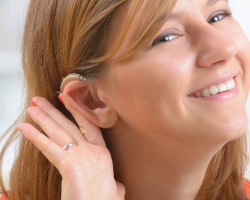
Aug. 29, 2022—Starting this fall, you may be able to buy a hearing aid without a prescription, a hearing test or even a fitting, thanks to a new U.S. Food and Drug Administration (FDA) rule.
Right now, you can only buy hearing aids with a prescription from an audiologist or other hearing aid professional, who may also fit and adjust the devices for you. The new rule, which takes effect Oct. 17, means hearing aids will be available in brick-and-mortar stores and online.
FDA's new rule is meant to get more hearing aids into the ears of people who need them. What could be easier than ordering a hearing aid online, right?
What to know
Over-the-counter (OTC) hearing aids are only for adults who think they have mild to moderate hearing loss, based on their symptoms.
Sound familiar? According to the National Institute on Deafness and other Communication Disorders (NIDCD), you might have this type of hearing loss if you:
- Are told by others that you play your TV too loud.
- Have to ask others to speak more slowly, talk louder or repeat themselves.
- Have trouble hearing when you're in a group, in a noisy area or on a phone.
- Notice that sounds seem muffled.
If your hearing loss is more severe, you will still need to see a healthcare provider for a prescription hearing aid. According to the NIDCD, you might have more severe hearing loss if you have trouble hearing loud sounds, such as cars, noisy appliances or loud music or if you have trouble hearing when you have conversations in quiet settings.
Expert advice
Even though you'll be able to buy an OTC hearing aid soon, you still might want to see a doctor first.
Hearing problems be caused by things other than aging or long-time noise exposure. They can be a sign of a serious condition. Or they may be caused by something fairly simple, like excess earwax that your doctor can remove. Always see a doctor if you have:
- Dizziness with hearing loss
- Ear drainage
- Hearing loss that comes on suddenly or is different in one ear.
- Pain in your ear.
If you do need a hearing aid, you may decide that you'll want a hearing health pro to help you choose one that best meets your needs and your lifestyle.
Another consideration: If you're thinking of buying an OTC hearing aid, you might want to find out if your insurance will help you pay for it.
An ounce of prevention
Hearing is precious and worth protecting. Here's how.